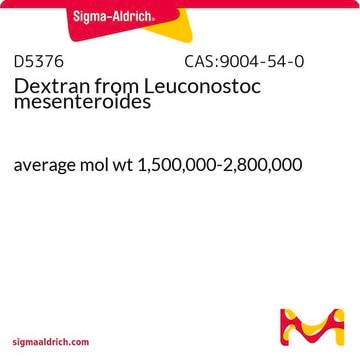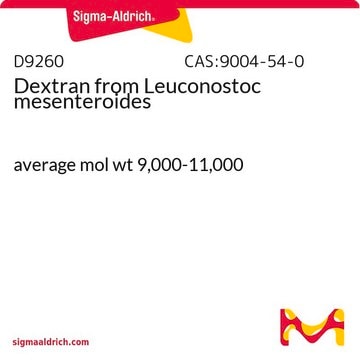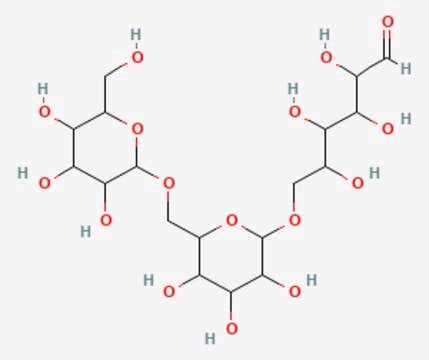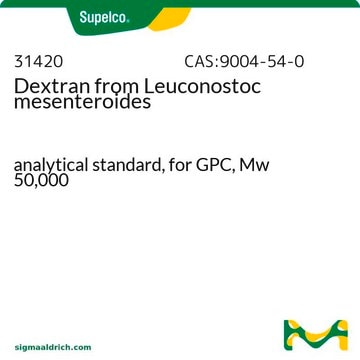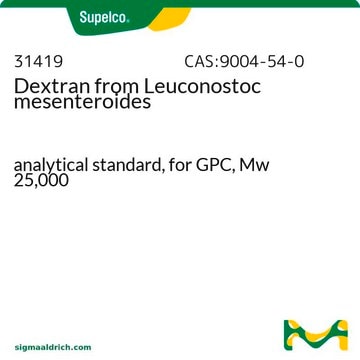D1662
Dextran from Leuconostoc mesenteroides
average mol wt 35,000-45,000
Synonym(s):
6-O-(6-O-beta-D-Glucopyranosyl-beta-D-glucopyranosyl)-D-glucose, Manninotriose
About This Item
Recommended Products
biological source
bacterial (Leuconostoc mesenteroides)
form
powder
optical activity
[α]/D 199°
mol wt
average mol wt 35,000-45,000
technique(s)
cell based assay: suitable
cryopreservation: suitable
color
white
solubility
H2O: 100 mg/mL, clear, colorless
application(s)
advanced drug delivery
cell analysis (
)
life science and biopharma
solubility enhancement
InChI
1S/C18H32O16/c19-1-5(21)9(23)10(24)6(22)3-31-17-16(30)14(28)12(26)8(34-17)4-32-18-15(29)13(27)11(25)7(2-20)33-18/h1,5-18,20-30H,2-4H2
InChI key
FZWBNHMXJMCXLU-UHFFFAOYSA-N
Looking for similar products? Visit Product Comparison Guide
Related Categories
General description
Application
Biochem/physiol Actions
- Osmotic Balance: Dextran helps maintain osmotic balance by increasing the solute concentration in a solution. This prevents excessive water movement across cell membranes, thus maintaining cell integrity and function.
- Cryoprotection: Dextran acts as a cryoprotectant by forming a protective barrier around cells and tissues during freezing. This barrier inhibits the formation of ice crystals, which can damage cell membranes and structures.
- Viscosity Control: Dextran can alter the viscosity of solutions by increasing the molecular weight of the solution. This change in viscosity affects the flow properties of the solution, making it useful in controlling the thickness of solutions in various processes.
- Drug Delivery: Modified dextran serves as a carrier for controlled drug delivery. Dextran can encapsulate drugs and release them gradually, enhancing drug solubility and controlling the release profiles to improve therapeutic outcomes.
- Gel Electrophoresis: Dextran increases the density of sample-loading solutions in gel electrophoresis. This increased density helps samples sink into the gel matrix, allowing for more precise separation of molecules based on size and charge during electrophoresis.
- Enzyme Stabilization: Dextran stabilizes enzymes by providing a protective environment. It forms a stable matrix around enzymes, enhancing their activity and extending their lifespan in various biochemical reactions. This protection prevents enzyme denaturation and inactivation, allowing enzymes to function more effectively.
Features and Benefits
- Dextran with an average molecular weight range of 35,000-45,000.
- Freely soluble in Water, DMSO, formamide, ethylene glycol, and glycerol
- Versatile and adaptable for various laboratory and research applications.
Linkage
Preparation Note
Other Notes
comparable product
Storage Class Code
11 - Combustible Solids
WGK
WGK 2
Flash Point(F)
Not applicable
Flash Point(C)
Not applicable
Personal Protective Equipment
Certificates of Analysis (COA)
Search for Certificates of Analysis (COA) by entering the products Lot/Batch Number. Lot and Batch Numbers can be found on a product’s label following the words ‘Lot’ or ‘Batch’.
Already Own This Product?
Find documentation for the products that you have recently purchased in the Document Library.
Customers Also Viewed
Protocols
Dextran polymer details: composed mainly of alpha-D-(1-6) linkages with varied branch lengths.
Dextran polymer details: composed mainly of alpha-D-(1-6) linkages with varied branch lengths.
Dextran polymer details: composed mainly of alpha-D-(1-6) linkages with varied branch lengths.
Dextran polymer details: composed mainly of alpha-D-(1-6) linkages with varied branch lengths.
Related Content
Dextrans are polysaccharides with molecular weights ≥1,000 Dalton, featuring a linear backbone of α-linked d-glucopyranosyl repeating units.
Dextrans are polysaccharides with molecular weights ≥1,000 Dalton, featuring a linear backbone of α-linked d-glucopyranosyl repeating units.
Dextrans are polysaccharides with molecular weights ≥1,000 Dalton, featuring a linear backbone of α-linked d-glucopyranosyl repeating units.
Dextrans are polysaccharides with molecular weights ≥1,000 Dalton, featuring a linear backbone of α-linked d-glucopyranosyl repeating units.
Our team of scientists has experience in all areas of research including Life Science, Material Science, Chemical Synthesis, Chromatography, Analytical and many others.
Contact Technical Service




